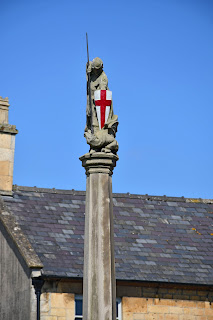The Cotswolds: From Moreton-in-Marsh to Chipping Norton
It was a sunny Sunday when Luqman and I set off for the last hike of our Oxford careers. Taking the first train to Moreton-in-Marsh, we arrived a little before half past ten. Moreton-in-Marsh was very quaint. We made sure to walk through the town centre to see the War Memorial, Curfew Tower, and the Redesdale Hall, circling around Saint David’s Church on our way from the centre. All the houses were constructed using stones of a warm cream colour, including the typically austere Anglican church.
The path from
Moreton-in-Marsh alternates between fields and forests, the former too warm
with a shirt on and the latter too cool without one. Fortunately, I had applied
sunscreen in the morning. Although we did not see the marshes for which the
town was named, we did encounter many flies and other flying critters, which
made us suspect that there must be some source of moisture around.
Around lunchtime, we
arrived at our first stop: Chastleton House. The estate was more imposing than
I expected, with walls that imitated castle turrets and a proper stone gate
guarding the entrance. Adjoining the House on the side was a church, and
viewing it from across the road stood a square roofed structure that would have
been nice to sit in were its floor not covered in sheep poo. An interesting
fact about Chastleton House is it is said to be the birthplace of competitive
croquet.
We did not take a tour
of the house but walked onwards along a path lined with towering ancient trees.
We ate lunch in front of the Saint Mary Magdalene Church in Adlestrop, after
which we bought crisps and ice cream in a nearby store. Lunch, I should remark,
is a quite generous term for our meal of sweets, nuts, and puffed corn; we
would have eaten something more substantial had there been any restaurant
between there and the Rollright Stones, which there was not.
At long last, we
reached the Rollright Stones, crossing the busy A44 to get there. Unbeknownst
to me, there are several groups of stones above Little Rollright. The so-called
Whispering Knights are the oldest and largest stones, once forming a proper dolmen
until the collapse of the top slab. Erected around 3800 BCE, they predate the
stone ring dubbed “The King’s Men” by about 1300 years. Finally, across the
road one can find the King Stone, likely erected around 1500 BCE. Passers-by
used to chip away parts of this stone to serve as talismans, prompting the
state to enact legal protection over the site as early as 1882.
Luqman’s phone died
shortly after we left the stones, so I downloaded the app with the route and
continued navigating from there. The final stretch was the most tiring, and we
were incensed when an old man had the audacity to nimbly run past us as we
trudged our way uphill. The worst part was yet to come, though. A few minutes
before Chipping Norton, I looked at my phone and saw that the next bus we were
estimated to make would leave in almost an hour. It occurred to me that the
line was an hourly one, which was confirmed by a quick search. The last seven
minutes of our journey, therefore, were spent half-running and half-jogging to
the bus stop, but the effort paid off.







































Comments
Post a Comment